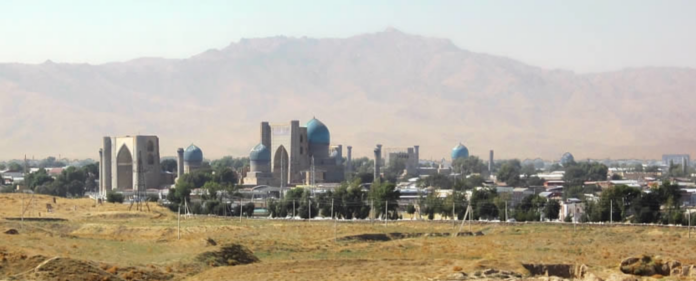The EU has a grand vision for democracy across the globe, and Central Asia is no exception. However, writes Zarina Mukasheva, the EU’s strategy to promote democracy in the region has so far failed to deliver
The EU’s Central Asia strategy
Bilateral cooperation through PCAs, Partnership and Cooperation Agreements, and EPCAs, Enhanced Partnership and Cooperation Agreements, underpins the EU’s engagement with Central Asia. The 2019 EU Strategy for Central Asia outlines a broad agenda to promote democracy as a central objective. The agenda aims to support good governance, civil society, the rule of law, and human rights across the post-Soviet Republics of Kazakhstan, Kyrgyzstan, Tajikistan, Turkmenistan, and Uzbekistan.
The EU’s approach stems from the belief that stable, democratic institutions are key to ensuring long-term regional stability and prosperity. This strategy includes various programmes designed to foster democratic processes and uphold human rights, emphasising the importance of these principles in the EU’s external relations.
The EU believes that stable, democratic institutions are key to ensuring long-term regional stability and prosperity
Olga Alinda Spaiser refers to Central Asia as the EU’s ‘neighbour of neighbours‘, which is strategically important because of its location and energy resources. The EU wants Central Asia to be a stable and prosperous region, ensuring long-term stability to their mutual benefit.
A focus on human rights
Local media in Central Asia have noted the EU’s efforts in human rights. Documents such as the recent EU Strategy, along with PCAs and EPCAs, emphasise human rights as crucial to the EU’s promotion of democracy. Indeed, local media often highlight this focus, recognising the EU’s role in advocating for human rights. Safeguarding human rights is an endeavour that the EU and Central Asian media share.
This alignment, however, is less evident in other areas of the EU’s promotion of democracy.
In our recent research, my co-authors and I discovered that while Central Asian media recognise the importance of human rights, it does not understand or acknowledge quite as clearly EU support for democratic governance, rule of law, and civil society development. Consequently, the EU’s broader democratic objectives may not be as effectively communicated or recognised in Central Asia as they might be.
Challenges and solutions
In Central Asia, political contexts and historical legacies wield significant influence on public discourse. The EU’s emphasis on democratic governance and institutional reforms may therefore not always resonate as intended. Local media coverage is sometimes sceptical or unclear about the EU’s comprehensive democratic goals because of geopolitical sensitivities, historical experiences, and differing local priorities.
In Central Asia, political contexts and historical legacies wield significant influence on public discourse, so the EU’s emphasis on democratic governance may not always resonate
These complex perceptions highlight a potential gap in communication and understanding between the EU and Central Asian countries. The EU may thus need to recalibrate its strategies to bridge this gap and address the multifaceted nature of democracy promotion more effectively.
What does the EU need to change?
- Enhance communication and engagement. The EU should fine-tune its messaging to explain clearly its full democracy promotion agenda. Engaging with local media and stakeholders is crucial to illustrate the broader goals of democratic governance and civil society development.
- Effect cultural and contextual sensitivity. It is essential for the EU to adapt its approach to fit local political and cultural contexts. Recognising and respecting historical and geopolitical factors can improve how Central Asia perceives democracy.
- Strengthen local partnerships. Building closer relationships with local organisations and institutions will provide the EU with better insights into regional perspectives. Strong partnerships with civil society, media, and authorities can lead to more effective and nuanced democracy promotion efforts.
- Reassess strategic objectives. The EU should conduct a thorough review of its current strategies and programmes in Central Asia. Adjusting these based on feedback and evolving local needs will enhance their effectiveness.
Connecting with communities
For the EU’s democracy efforts to be truly effective in Central Asia, it is not enough simply to champion lofty ideals from afar. The real game-changer would be for the EU to forge genuine connections with local communities. By listening to regional voices and tailoring strategies to local realities, the EU can transform its well-intentioned goals into tangible, impactful change that resonates deeply with the people who matter most.
Recently, the EU has taken a significant step by engaging with a diverse array of voices of officials, scholars, business leaders, and civil society representatives from Central Asia in crafting its renewed strategy. This move is not just a nod to the region’s importance but a genuine effort to incorporate local perspectives. Hence, to address problems effectively and achieve positive outcomes, it’s crucial that EU programmes and projects continue to engage Central Asian experts and think tanks in specific areas. This collaboration ensures that solutions are tailored to the region’s unique challenges and opportunities.
By listening to regional voices, the EU can transform its well-intentioned goals into impactful change that resonates with the people who matter most
Moreover, involving local stakeholders in the planning and implementation processes helps to bridge the gap between European policies and Central Asian realities. This participatory approach can lead to more sustainable outcomes and greater local ownership of the initiatives. By aligning its efforts with the unique cultural, political, and social dynamics of Central Asia, the EU can create strategies that resonate deeply with its people. Undoubtedly, this will lead to more effective and enduring democratic progress in the region.

